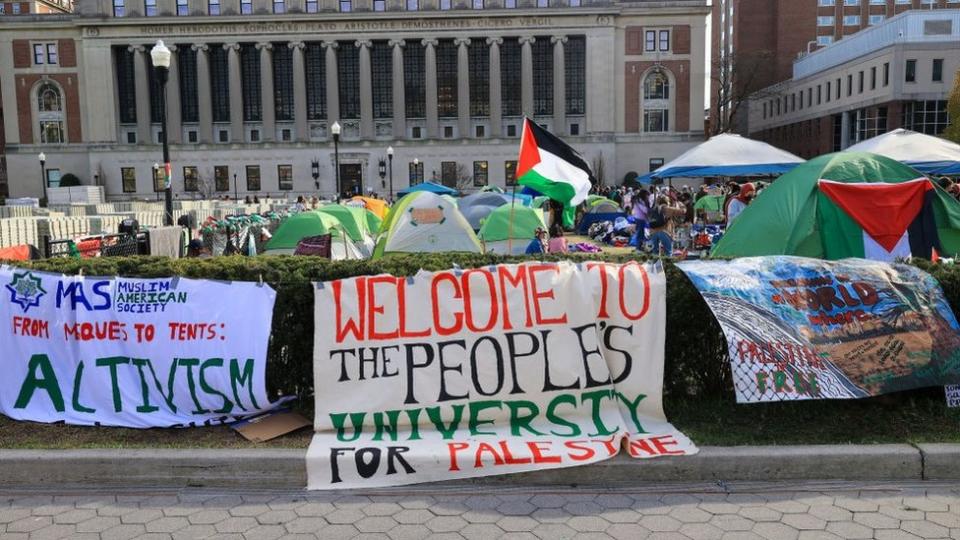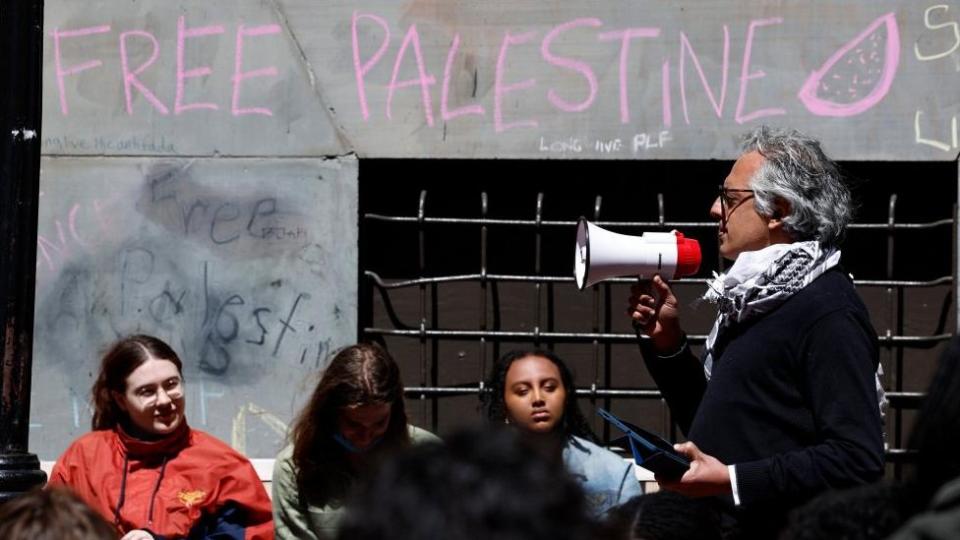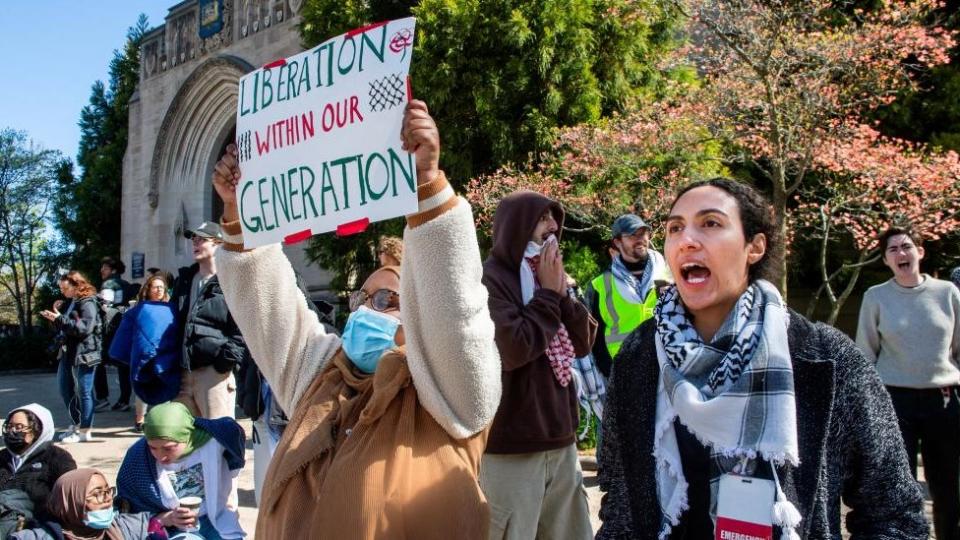Columbia University: Pro-Palestinian protesters refuse to disband
Pro-Palestinian protesters have refused to disband from Columbia University's main campus after a midnight deadline was set by the institution's president.
Nemat Shafik warned demonstrators that "alternative options" would have to be considered for clearing the area on the New York City campus if an agreement with demonstrators was not reached.
A group representing pro-Palestinian protesters said it would not continue engaging in negotiations.
No police action has been reported.
The standoff comes as tense Gaza war protests have spread to US colleges nationwide.
Some 133 people were arrested on Monday in protests at New York University.
Dozens of arrests were also made in rallies at Yale, while Harvard has restricted access to the campus.
Gaza war demonstrations have also cropped up at colleges in the US Midwest and on the West Coast, where one campus has been closed.
At Columbia, officials said on Tuesday that an ongoing protest encampment on university grounds - in Manhattan - is in violation of the rules.
Ms Shafik announced a midnight deadline for negotiations as a result, stating that the university "will have to consider alternative options for clearing the West Lawn and restoring calm to campus so that students can complete the term and graduate" if an agreement between students and administration staff was not reached.
Just after midnight, Columbia University Apartheid Divest - a coalition of pro-Palestinian student groups - said it would not continue to engage in negotiations "until there is a written commitment that the administration will not be unleashing the NYPD or the National Guard on its students".
Prior to the president's warning, the university extended remote classes at the campus for the rest of term.
Columbia provost Angela Olinto announced students would have the option of attending classes remotely at the Ivy League institution's main Morningside Campus until the last day of classes on 29 April.
"Safety is our highest priority," she said in an email.
Jewish students have expressed concern about antisemitism on and around Columbia's campus.
On Monday, President Joe Biden said he condemned both "the antisemitic protests" as well as "those who don't understand what's going on with the Palestinians".

One student filed an NYPD hate crime report on Monday saying that he had been hit in the head with a rock while carrying an Israeli flag, the New York Post reported.
Shai Davidai, a Columbia University professor who has been outspoken about his support for Israel, said he was banned from campus and his ID was "deactivated".
Columbia Students for Justice in Palestine said they "firmly reject any form of hate or bigotry" and disavowed "inflammatory individuals who do not represent us".
The Columbia University president said tensions on campus had been "exploited and amplified by individuals who are not affiliated with Columbia who have come to campus to pursue their own agendas".
Dr Shafik last week defended her efforts to tackle antisemitism on campus as she testified to a US congressional committee.
Also last week, New York City police arrested more than 100 people amid Gaza war demonstrations on Columbia's campus, including the daughter of Democratic congresswoman Ilhan Omar.

Elsewhere, nine students were arrested in Minneapolis on Tuesday morning as they attempted to set up a protest camp in front of a library on the University of Minnesota campus.
In New York on Tuesday, several hundred protesters were gathered near the NYU campus in Washington Square Park.
The crowd chanted "shame, shame" and protesters criticised New York city police and university administrators.
Police were called to NYU on Monday to break up demonstrations after university officials warned hundreds of protesters to leave.
University leaders accused the group of breaching school barricades and said they were behaving in a "disorderly, disruptive and antagonising" manner.
Authorities at NYU also suggested protesters without links to the university had turned up.
Dylan, an NYU student who declined to give his surname to the BBC, said NYU administrators are "trying to flip the script and say that this was a disruptive and antagonising protest.
"We were chanting. We were singing. We were drumming. If that represents violence, I don't know on which basis NYU is reasoning."

The campus unrest has caused a dilemma for higher education officials as they try to balance free speech rights with the need to maintain a safe and inclusive space for learning.
Harvard University has closed public access to the centre of its campus until Friday in apparent anticipation of similar student protests.
On the US West Coast, pro-Palestinian students set up "solidarity encampments" on Monday at the University of California, Berkeley, and California State Polytechnic University, Humboldt.
At Cal Poly, the campus has been closed until at least Wednesday due to the "dangerous and volatile situation", school officials said, which included students using tents and beds to blockade one of the buildings.
A similar encampment has been set up at the University of Michigan.
Activists have been calling for universities to "divest from genocide".
They accuse colleges of using students' tuition money to invest in companies supporting Israel's war in Gaza.
Israel strongly denies any suggestion that it is committing genocide in the Palestinian enclave, though the International Court of Justice has said the accusation was "plausible".
The war began when Hamas gunmen carried out an unprecedented attack on southern Israel on 7 October, killing about 1,200 people - mostly civilians - and taking 253 others back to Gaza as hostages.
More than 34,180 people - most of them children and women - have been killed in Gaza since then, the territory's Hamas-run health ministry says.
With reporting from Rebecca Hartmann in New York

Are you a student in the US? Please share your experiences by emailing haveyoursay@bbc.co.uk.
Please include a contact number if you are willing to speak to a BBC journalist. You can also get in touch in the following ways:
WhatsApp: +44 7756 165803
Tweet: @BBC_HaveYourSay
Please read our terms & conditions and privacy policy
If you are reading this page and can't see the form you will need to visit the mobile version of the BBC website to submit your question or comment or you can email us at HaveYourSay@bbc.co.uk. Please include your name, age and location with any submission.


